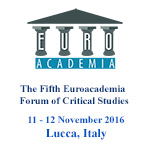Euroacademia Conferences
 Europe Inside-Out: Europe and Europeanness Exposed to Plural Observers (9th Edition) April 24 - 25, 2020
Europe Inside-Out: Europe and Europeanness Exposed to Plural Observers (9th Edition) April 24 - 25, 2020 Identities and Identifications: Politicized Uses of Collective Identities (9th Edition) June 12 - 13, 2020
Identities and Identifications: Politicized Uses of Collective Identities (9th Edition) June 12 - 13, 2020 8th Forum of Critical Studies: Asking Big Questions Again January 24 - 25, 2020
8th Forum of Critical Studies: Asking Big Questions Again January 24 - 25, 2020 Re-Inventing Eastern Europe (7th Edition) December 13 - 14, 2019
Re-Inventing Eastern Europe (7th Edition) December 13 - 14, 2019 The European Union and the Politicization of Europe (8th Edition) October 25 - 26, 2019
The European Union and the Politicization of Europe (8th Edition) October 25 - 26, 2019 Identities and Identifications: Politicized Uses of Collective Identities (8th Edition) June 28 - 29, 2019
Identities and Identifications: Politicized Uses of Collective Identities (8th Edition) June 28 - 29, 2019 The European Union and the Politicization of Europe (7th Edition) January 25 - 26, 2019
The European Union and the Politicization of Europe (7th Edition) January 25 - 26, 2019 7th Forum of Critical Studies: Asking Big Questions Again November 23 - 24, 2018
7th Forum of Critical Studies: Asking Big Questions Again November 23 - 24, 2018 Europe Inside-Out: Europe and Europeanness Exposed to Plural Observers (8th Edition) September 28 - 30, 2018
Europe Inside-Out: Europe and Europeanness Exposed to Plural Observers (8th Edition) September 28 - 30, 2018 Identities and Identifications: Politicized Uses of Collective Identities (7th Edition) June 14 - 15, 2018
Identities and Identifications: Politicized Uses of Collective Identities (7th Edition) June 14 - 15, 2018
Nikki Lee’s Transgender Performance: The Projects of Drag Queens, Lesbians and Strip Dancers
-
-

-
Presentation speakers
- Vivian Kuang Sheng, Department of History of Art, University of York, UK
- Download presentation
Abstract:
Between 1997 and 2001, the New York-based Korean conceptual photographer Nikki Lee conducted a series of performative, photographic Projects mainly in New York and other major American cities. In her works, Lee appears as a slippery agent, infiltrating a range of American social and cultural groups, such as drag queens, strip dancers, yuppies, Latinos, lesbians, black hip-hoppers and skateboarders. For each project, Lee dramatically alters her appearance through a blend of clothing, make-up, diet, hair extension and use of hair dye, as well as tanning salons. After transforming herself, in her own words, into someone who looks like ‘eighty percent of any person from whichever group’, Lee accesses to each chosen community with a point-and-shoot camera and announces her artistic intention to become a member for a short period of time. She spends time with other group members, adopting their postures, behaviours and mannerisms and joining in their everyday activities. To document her temporary membership, Lee asks a passer-by to take snapshot photographs of herself in the disguise of other group members. Lee’s practice illustrates identity as relational, which is formed and reformed through identification with others. Her Projects propose a distinctive way of imaging identity, which is, as the philosopher Alison Weir has argued, based not on a presumed sameness, but on an openness to transformation of the self and the relations with other subjects. With a specific focus on Lee’s Projects in association with the formation of gender identity, this paper reconsiders Judith Butler’s conception of ‘drag’, and examines in what way this mode of drag performativity is practiced in Lee’s playful performance of ‘gender trouble’, raising questions about the construction and representation of both individual and collective identities in contemporary society.
-
Related Presentations

The Biopower of Neoliberalism
- Sebastian Ramirez

European Cities and New Inhabitants: A Heritage Contribution by Migrants
- Stefania Scarsini













